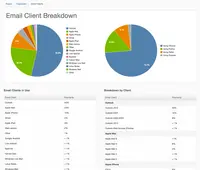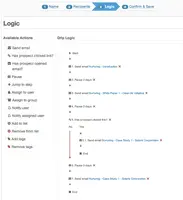Salesforce Marketing CloudFormerly Pardot, Evergage, ExactTarget, MyBuys, Datorama, etc.
Starting at $1,250 per month per installation
View PricingOverview
What is Salesforce Marketing Cloud?
Marketing Cloud is an AI-powered, cloud-based digital marketing platform within the Salesforce Customer 360 ecosystem. Marketers can segment their audience, deliver personalized messages, track campaign performance, engage leads and accounts, and optimize strategies based on real-time insights.
Recent Reviews
How Salesforce Marketing Cloud Differs From Its Competitors
Awards
Products that are considered exceptional by their customers based on a variety of criteria win TrustRadius awards. Learn more about the types of TrustRadius awards to make the best purchase decision. More about TrustRadius Awards
Popular Features
- A/B testing (139)8.484%
- Email deliverability reporting (119)8.383%
- Dynamic content (140)8.282%
- List management (116)7.575%
Reviewer Pros & Cons
Pricing
Account Engagement
$1,250
Cloud
per month
Engagement
$1,250
Cloud
per month
Intelligence
$3,000
Cloud
per month
Entry-level set up fee?
- No setup fee
For the latest information on pricing, visithttps://www.salesforce.com/products/mar…
Offerings
- Free Trial
- Free/Freemium Version
- Premium Consulting/Integration Services
Starting price (does not include set up fee)
- $1,250 per month per installation
Product Demos
Pardot Engagement Studio: How-to Demo
YouTube
How to Use Pardot Salesforce Engage
YouTube
Pardot Demo: A Pardot Introduction for Beginners
YouTube
Pardot Marketing Automation Demo
YouTube
Inspire Meaningful Moments Through Salesforce Marketing Cloud | Salesforce Demo
YouTube
Salesforce Marketing Cloud Account Engagement: B2B Marketing Automation Overview Demo
YouTube
Features
Return to navigation
Product Details
- About
- Integrations
- Competitors
- Tech Details
- FAQs
What is Salesforce Marketing Cloud?
Salesforce Marketing Cloud is a marketing platform that helps companies of all sizes get to know their customers through unified profiles, personalize offers across any channel with AI, and build lasting relationships that drive business growth. Marketing Cloud provides data that is actionable, personalization that scales, and marketing that is connected.
Salesforce Marketing Cloud Features
Email & Online Marketing Features
- Supported: WYSIWYG email editor
- Supported: Dynamic content
- Supported: Ability to test dynamic content
- Supported: Landing pages
- Supported: A/B testing
- Supported: Mobile optimization
- Supported: Email deliverability reporting
- Supported: List management
- Supported: Triggered drip sequences
Lead Management Features
- Supported: Lead nurturing automation
- Supported: Lead scoring and grading
- Supported: Data quality management
- Supported: Automated sales alerts and tasks
Campaign Management Features
- Supported: Calendaring
- Supported: Event/webinar marketing
Social Media Marketing Features
- Supported: Social sharing and campaigns
- Supported: Social profile integration
Reporting & Analytics Features
- Supported: Dashboards
- Supported: Standard reports
- Supported: Custom reports
Platform & Infrastructure Features
- Supported: API
- Supported: Role-based workflow & approvals
- Supported: Customizability
- Supported: Integration with Salesforce.com
- Supported: Integration with Microsoft Dynamics CRM
- Supported: Integration with SugarCRM
- Supported: Third-party software integrations
Salesforce Marketing Cloud Screenshots
Salesforce Marketing Cloud Integrations
Salesforce Marketing Cloud Competitors
Salesforce Marketing Cloud Technical Details
| Deployment Types | Software as a Service (SaaS), Cloud, or Web-Based |
|---|---|
| Operating Systems | Unspecified |
| Mobile Application | Apple iOS, Android, Mobile Web |
| Supported Countries | All |
Frequently Asked Questions
Marketing Cloud is an AI-powered, cloud-based digital marketing platform within the Salesforce Customer 360 ecosystem. Marketers can segment their audience, deliver personalized messages, track campaign performance, engage leads and accounts, and optimize strategies based on real-time insights.
Salesforce Marketing Cloud starts at $1250.
Adobe Marketo Engage, HubSpot Marketing Hub, and Act-On Software are common alternatives for Salesforce Marketing Cloud.
Reviewers rate Integration with Salesforce.com highest, with a score of 8.7.
The most common users of Salesforce Marketing Cloud are from Mid-sized Companies (51-1,000 employees).








